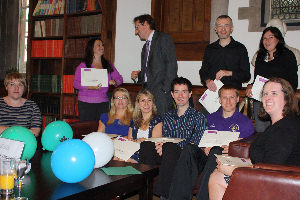Out of the comfort zone: DSE develops its Future Talent
11 Sep 2013
The DSE recently celebrated the graduation of the first batch of participants from a new initiative which provides support for promising staff to work on real projects from outside their home areas.

On 29 August, members of DSE staff gathered with their sponsors, line managers, trainers and organisers in Christie’s Bistro to celebrate the conclusion of the first session of the DSE Future Talent initiative, which ran from January to July 2013.
Future Talent grew out of the DSE’s recognition that development opportunities were needed for staff on grades 5/6 with ‘potential’ and that the Directorate, because of its size and breadth, was ideally positioned to offer such opportunities.
Developed with Sandra Booth from the STDU and Alison Hamilton from the EPS eLearning Team, the programme selected 12 participants as a cross-section of the DSE. They worked initially on personal style and team dynamics and attended skills workshops in project management, data and report writing.
Then they were paired off with colleagues whom they didn’t know well to undertake real projects from DSE work areas outside of their ‘home’ areas: work that was genuinely needed, but for which there was no resource. Support was provided in the form of Action Learning Sets - a peer support-type development tool - and mentoring. Throughout the project period, the participants continued to work on their ‘day’ jobs.
Future Talent was the brain child of the DSE’s Jenny Wragge and Mike Mercer, who first proposed the idea 18 months ago. Speaking at the presentation, Jenny said: “Future Talent is actually a bit of a misnomer, as it’s clear that the talent is already here – to be developed and used by the DSE.”
Responding on behalf of the participants, Al Clark, Environmental and Sustainability Officer, said: “It’s been a really great initiative, which has given us all an exciting opportunity to see a different side of the DSE – and to appreciate the problems faced by the project sponsors.”
Tim Westlake, Director for the Student Experience, said that one of the most important outcomes of this “home-grown” approach to staff development had been to show that the DSE could both innovate and work as a single team.
Before presenting the programme certificates, Tim told the participants: “Undertaking a project in another area from your usual work area provides valuable insight that other areas are just as important or busy as your own. Some of you were working outside your comfort zones, which is a crucial skill in this rapidly changing HE environment: Future Talent gave you an opportunity to do this in a safe environment.”
The work completed in the projects lead to recommendations which are now being turned into reality across the DSE.
Now that the formal part of their development programme is over, the group will continue in existence as an informal support network.
With a waiting list for further Future Talent programmes and very encouraging feedback from this year’s participants, the DSE will carry out a full evaluation of the pilot and, if all goes well, they’ll be planning to run it again.
